Over a year ago, I read that Benedict Cumberbatch, of Sherlock, Frankenstein and Smaug fame, was to play Hamlet, live, at the Barbican Theatre in London this year. And I have a group of friends who, like me, like going to the theater- we've previously seen David Tennant in Hamlet, and more recently, in Richard II, and agreed that seeing Mr Cumberbatch's Hamlet would be a good thing to do.
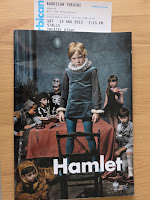 So, with some difficulty, I managed to buy the maximum 6 tickets permitted, (it later turned out that the show was the fastest seller in, well, pretty much ever. I was lucky that there were only a couple of hundred people ahead of me in the queue when I booked - later that day there were lover 10,000)
So, with some difficulty, I managed to buy the maximum 6 tickets permitted, (it later turned out that the show was the fastest seller in, well, pretty much ever. I was lucky that there were only a couple of hundred people ahead of me in the queue when I booked - later that day there were lover 10,000)
And a year went by, and on 15th August I reached the point where I was sitting in the stalls, in the Barbican theatre, waiting for the Prince of Denmark.. As the man says 'the readiness is all'
So, was it worth the wait?
I think so.
It should be mentioned that we saw the play on 15th August, which was (although not made clear when we booked, or on our tickets) a preview, 10 days into the run.
The play opens, not with the usual scene of Bernardo and Marcellus on the ramparts of Elsinore, but instead with Hamlet, alone on stage, looking though tea-chests (apparently paced with childhood items) while Nat King Cole’s “Nature Boy” plays on an old gramophone player. (The music familiar to many of us as the music from the film 'Moulin Rouge'), establishing him as, at the very least, a little melancholic.
We then moved to a the wedding breakfast, with vast displays of white flowers and of hunting trophies, as Claudius deals with the ambassadors to Norway, Laertes' wish to return to college, an Hamlet's own moodiness.
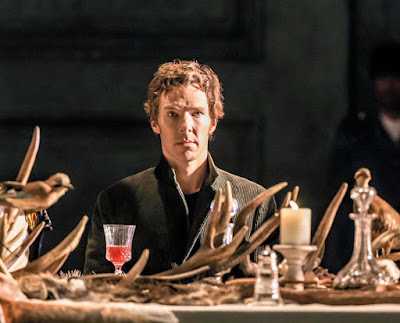
|
Hamlet: Scene 2 (official pic by Johan Persson) |
Shortly after this picture was taken, Hamlet starts walking on the table and giving the 'O, that this too, too solid flesh..' soliloquy (with the rest of the cast moved in slow-motion, which I thought was an effective way of allowing the soliloquies to be given, and to be clearly internal, despite the number of other people on stage.)
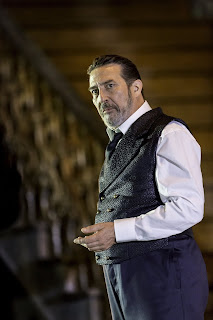
|
Claudius - a trustworthy King (photo credit as before) |
Very effective.
Obviously Cumberbatch is the headliner in the production, but the cast as a whole is very strong:
Ciaran Hinds' Claudius doesn't really let the menacing, dangerous side of the character out in the earlier scenes of the play, but as the play progresses and he begins to fear Hamlet, and his own conscience, he becomes more obviously threatening.
Kobna Holdbrook-Smith was a hugely powerful and commanding Laertes. Given that he has a relatively small amount of time on stage, he packed one hell of a punch.
I don't think I have seen Holdbrook-Smith before but will definitely be looking out for him in future!
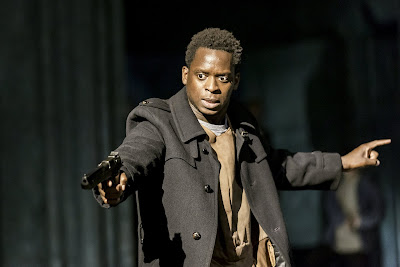 |
| Laertes |
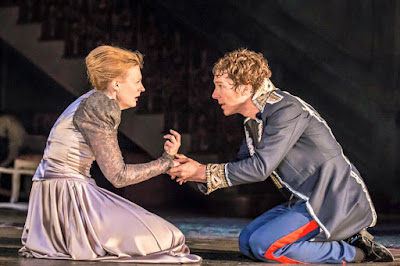 |
| Gertrude and Hamlet |
I was a little less impressed with Ophelia (Sian Brooke) and with Horatio (Leo Bill) as characters, although I think n both cases this was a fault in the production not in the actors. In neither case did their relationships with Hamlet quite 'jell', for me. Ophelia's madness was beautifully done in its subtle contrast with Hamlet's own feigned madness, but she was less convincing as a object of his love, or even as a 'safe' friend for the emotionally immature Hamlet of this production.
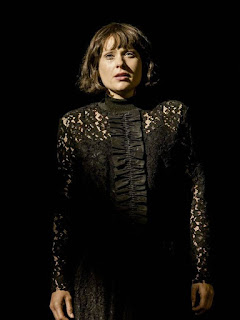 |
| Ophelia |
Horatio seemed affectionate but a little distant until the very end of the play, and as a result his anguish at Hamlet's death seemed less consistent with his earlier relationship than it sometimes does. I would love to see the production again, and see whether this changes as Cumberbatch and Bill settle into working together. We did, after all, see a production only 11 performances into the run. I'm planning to see the NTLive broadcast on 15th October, and will be curious to see how the production changes.Rosencrantz and Guildenstein got what was coming to them.
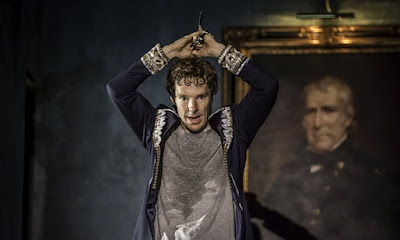
What of the man himself?
I was *very* impressed.Cumberbatch's Hamlet has moments of pure, 'Sherlock' style intellect, (Hamlet's reaction to the Ghost' command to the soldiers to 'swear' is perfect!) lots of physical work, and much more humour than you normally see in Hamlet.
This Cumberbatch chap is pretty got with the acting. I think he will go far. Who knows, perhaps he will even make it to Hollywood one day! 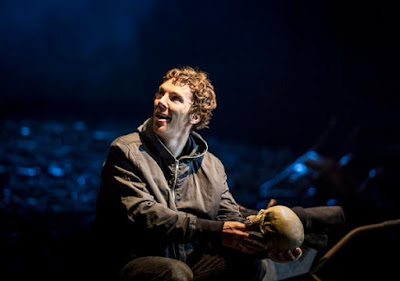
And the show is worth seeing for the toy fort part alone. Which brings me on to the set.
Which is huge. The Barbican stage is BIG, and this set takes full advantage of that. And there is a lot going on. The set is the Palace, huge, and formal (and gradually cracking and deteriorating over the course of the play, mirroring the destruction of the lives of those on stage, and that part really works. There is a sweeping staircase, and a balcony to one side of the stage, which works well for all the plotting.
I was less enamoured of the set dressing - lots of white garlands for the wedding breakfast, and lots of flowers, bizarrely arranged in brass instruments , for the play-within-a-play, as well as an entire mini-theatre, and a war room. Again, it may be that the scene changes will get a little slicker over time, but I did find some of them a little distracting. I will admit, however, that full size toy fort in which Hamlet plays, establishing his madness, was a lot of fun!
Over all, it's a very good production, with a very strong ensemble cast, some interesting cuts and changes in the text, and just a few too many props! I was happy to see that although some well known lines were cut (Polonius, I'm looking at you) and others appeared in unexpected places, Fortinbras made the cut. There were probably even some sledded Polacks in the wings, if one only knew where to look.
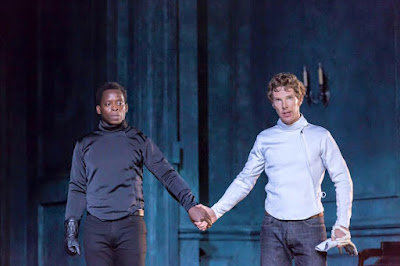 |
| Laertes and Hamlet. Not going to end well. |
Oh, and Benedict knocked over a case of swords during the curtain call, proving he is human, and then very tidily picked them up off the floor before taking his bow!
I am very glad that I got to see it, and I'm looking forward to seeing it again at the cinema. And even if you can't see the show lie, do go to the broadcast if you get a chance. I give it 4.5 / 5 stars. (half off for the flowers-inna-tuba) (edited to add: the NT Live trailer is up on youtube- well worth listening to!)































